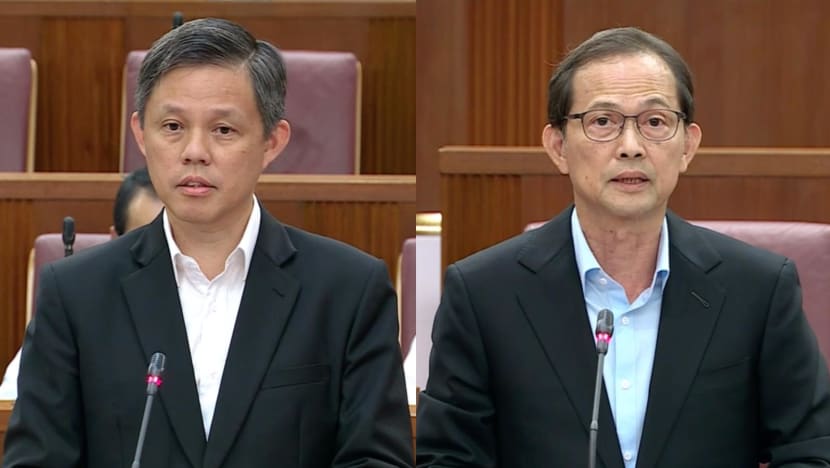'Please do not twist our words': Chan Chun Sing tells Leong Mun Wai in debate over making Israel-Hamas lesson materials public
"I have never accused anyone in this House of being divisive," said the Education Minister in response to PSP MP Leong Mun Wai's claim that he is "always accused of being divisive".

Minister for Education Chan Chun Sing (left) and Progress Singapore Party's Leong Mun Wai debated in parliament on Apr 2, 2024, about making public the lesson materials on the Israel-Hamas conflict.

This audio is generated by an AI tool.
SINGAPORE: Progress Singapore Party's (PSP) Leong Mun Wai debated with Minister for Education Chan Chun Sing in parliament on Tuesday (Apr 2) as he called for the materials used in school lessons on the Israel-Hamas conflict to be made public.
Mr Leong also said he and fellow PSP member Hazel Poa were "always accused of being divisive". But Mr Chan said he "never accused anyone" in the House of being divisive, adding: "Please do not twist our words."
The Education Ministry has been "more than transparent" on the Character and Citizenship Education (CCE) lessons that covered the Israel-Hamas conflict, Mr Chan said.
"We are not only prepared to show the parents the material, we’re prepared to explain to the parents how the materials are used, rather than to just give a deck of slides, which can be taken out of context," he said.
The slides alone do not fully communicate how the Education Ministry teaches the subject, Mr Chan stressed.
"We welcome parents with concerns to come and see the teachers who will explain to them how the lesson is conducted. This is much better than just looking at a deck of slides without explanation."
In Parliament on Tuesday (Apr 2), Education Minister Chan Chun Sing said he had addressed the questions on the Character and Citizenship Education (CCE) lesson on the Israel-Hamas conflict during the Committee of Supply debate in March, and his response can be found on the website of the Ministry of Education (MOE). Replying to a supplementary question from NCMP Leong Mun Wai on the need for transparency, Mr Chan said MOE is “being more than transparent” - it is not only prepared to show the parents the material but is also prepared to explain to them how the material is used. He said MOE is going out of its way to assure parents on how the lessons are conducted.
Mr Leong and Ms Poa had initially filed parliamentary questions on the Ministry of Education's (MOE) handling of the CCE lessons that covered the Israel-Hamas conflict.
Mr Chan asked Mr Leong and Ms Poa to refer to his previous speech on the matter in March when he said that the classes would be further customised for different age groups of students, and that teachers would get more support.
The opposition MP responded by questioning if it was "justifiable" not to release the slides that were used in the lessons.
He also asked the government to commit to making all materials used for CCE lessons public “so that parents would know what has been taught to their children”.
“I have actually made an effort to go to the bookstore and got a textbook for CCE for Primary 6 students. From the content of the textbook, you cannot imagine that a complex and controversial current issue like the Israel-Hamas conflict will be taught to our children,” he added.
Concerns about what schools are teaching about the conflict in Gaza surfaced in February, with some online posts claiming that students were presented with a narrative that was not neutral or objective.
It prompted the Education Minister to address the issue, explaining on Feb 25 that the CCE lessons on the Israel-Hamas conflict are designed to help students reflect on how to safeguard cohesion and harmony in a multiracial society.
They are not intended to be history lessons nor are they meant to ascribe who is right or wrong, Mr Chan said, a point he reiterated in parliament on Mar 4.
Mr Chan said on Tuesday that it would take Singapore time to reach a stage where it can respond to crises as one united country.
"But to do that, we have to first understand and appreciate that we are very different. We have different backgrounds, we have different perspectives. And while we may be different in our outlook and perspectives, we can all share the same goal to unite and not let others divide us," he added.
Mr Leong said that the PSP is “not particularly against” any topics raised in CCE lessons, “as long as there is a defined process”.
“Every time we raise questions that may not be in line with what the government wants, we are always accused of being divisive. In this case, Minister of Education just said that we are not being united.
“But I think what we are trying to do here … from the response the minister has given to us on this issue, does it reflect enough transparency and also clarity on the process of how the materials are being decided?”
Mr Chan replied: “Please do not twist our words. I have never accused anyone in this House of being divisive.”
Instead, Mr Chan said he meant that there are differing views in Singapore's population, and CCE lessons are meant to help people understand and respect those differences.
Ms Poa also asked how many schools have organised dialogue sessions since Mr Chan said in March that MOE would rather meet with parents or members of the public face-to-face and explain how the slides are used.
So far, some schools have received such requests, although most schools have not. The ones that received requests have engaged parents on the matter, said the Education Minister.
In March, Mr Chan said that the lesson material would be further simplified for younger students, focusing on sensitising them to the plight of innocent victims, while older students will be taught to be more discerning of different sources of information.
For the “most mature” students, lesson materials will be updated based on more recent events to help them better understand Singapore’s national interest, Mr Chan said last month.


















